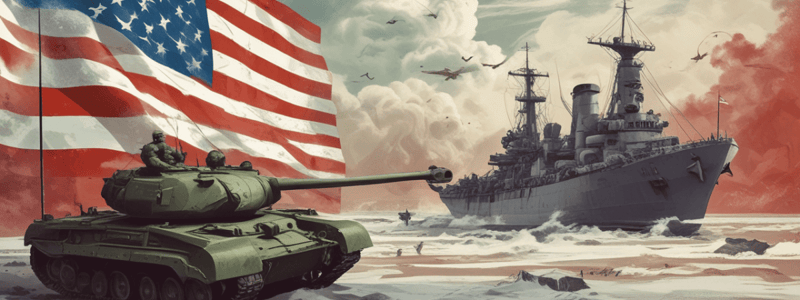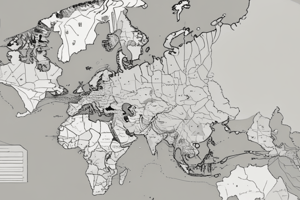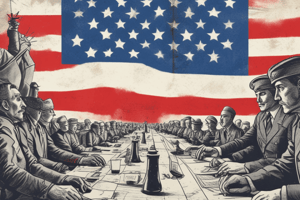Podcast
Questions and Answers
What was the primary reason for the shift from cooperation to tensions between the US and the Soviet Union after WWII?
What was the primary reason for the shift from cooperation to tensions between the US and the Soviet Union after WWII?
- Dispute over post-war reconstruction of Africa
- Disagreement over the United Nations structure
- Soviet expansion in Eastern Europe and US development and use of atomic bombs (correct)
- Competition for influence in South America
What was the core value of the Capitalist Democracy ideology promoted by the US?
What was the core value of the Capitalist Democracy ideology promoted by the US?
- Socialist revolution
- Individual freedom and free markets (correct)
- State control of the economy
- Collective ownership of the means of production
Which of the following was a key agreement reached at the Yalta Conference?
Which of the following was a key agreement reached at the Yalta Conference?
- The Soviet withdrawal from Eastern Europe
- The establishment of the European Union
- The division of Germany into occupation zones (correct)
- The formation of NATO
What was the primary focus of the Communist Ideology promoted by the Soviet Union?
What was the primary focus of the Communist Ideology promoted by the Soviet Union?
Who was the Soviet leader that attended the Yalta Conference?
Who was the Soviet leader that attended the Yalta Conference?
What was the purpose of the Potsdam Conference?
What was the purpose of the Potsdam Conference?
What was the significance of the Soviet Union's participation in the United Nations?
What was the significance of the Soviet Union's participation in the United Nations?
Which of the following was a consequence of the tensions between the US and the Soviet Union?
Which of the following was a consequence of the tensions between the US and the Soviet Union?
What was the primary difference between the Capitalist Democracy and Communist Ideologies?
What was the primary difference between the Capitalist Democracy and Communist Ideologies?
Who was the US President that attended the Potsdam Conference?
Who was the US President that attended the Potsdam Conference?
Flashcards are hidden until you start studying
Study Notes
Soviet-US Relations
- Post-WWII, the US and Soviet Union emerged as superpowers with differing ideologies and interests.
- Initial cooperation during WWII gave way to tensions and mistrust, fueled by:
- Soviet expansion in Eastern Europe
- US development and use of atomic bombs
- Competition for influence in Europe and Asia
Cold War Ideologies
- Capitalist Democracy (US):
- Emphasized individual freedom, free markets, and democratic governance
- Saw communism as a threat to these values
- Communist Ideology (USSR):
- Focused on collective ownership, state control, and socialist revolution
- Viewed capitalism as exploitative and imperialistic
Yalta Conference (February 1945)
- Meeting between US President Franklin D. Roosevelt, Soviet Premier Joseph Stalin, and British Prime Minister Winston Churchill
- Key agreements:
- Post-war reorganization of Europe
- Division of Germany into occupation zones
- Soviet participation in the United Nations
- Soviet influence in Eastern Europe
Potsdam Conference (July-August 1945)
- Meeting between US President Harry S. Truman, Soviet Premier Joseph Stalin, and British Prime Minister Winston Churchill (later replaced by Clement Attlee)
- Key agreements:
- Potsdam Declaration: called for Japan's surrender
- Reparations and demilitarization of Germany
- Establishment of the Council of Foreign Ministers
- Disagreements on German occupation and Soviet influence in Eastern Europe
These conferences marked the beginning of the Cold War, as the Soviet Union and the United States began to diverge in their post-war visions and ideologies.
Studying That Suits You
Use AI to generate personalized quizzes and flashcards to suit your learning preferences.




